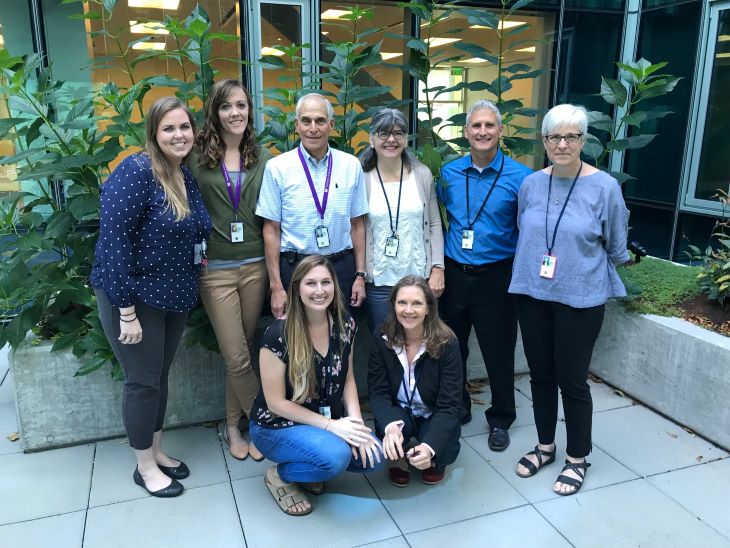With continued advances in technology, apps for smartphones and other mobile devices can provide an ideal way for Veterans to manage aspects of their wellness outside of traditional in-person appointments with a health care provider. Apps offer support and information at users’ fingertips, wherever they are — 24 hours a day, seven days a week.
Some apps and other remote tools are becoming not only increasingly common but also more specialized to help with particular health issues. Apps can fill the gap where traditional care leaves off, reaching Veteran populations that need the most assistance, such as those who served in Operation Enduring Freedom and Operation Iraqi Freedom, as well as those who have difficulty visiting a provider in person.
VA researchers often partner with the staffs of universities and private companies to study whether apps are useful to Veterans and serve their intended purpose. Using feedback from the studies, VA can then tailor apps to meet Veterans’ unique needs.
Helping Veterans Step Away from alcohol
VA’s Center of Excellence in Substance Addiction Treatment and Education (CESATE) in Seattle is involved in a partnership to study Step Away, a publicly available app that is geared toward reducing alcohol use. Step Away allows users to track their drinking and offers judgment-free guidelines to help users cut back, if they wish. It can provide the support that people may need to refrain from drinking alcohol — support that is especially useful during high-risk times, like holidays and happy hours.
One Veteran participant in the CESATE study noted, “I’ve actually cut back quite a bit in consumption, and it’s made a big difference to me.” Another Veteran explained that, although it might seem as if the app would be inconvenient to use, he didn’t find that to be true.
“It is not intrusive. It’s very simple, very quick, very easy, and it helps,” he said. “You don’t have to quit drinking, but if you want to help get a little bit more control on it, there’s different methods and ways that you might not have thought of that are on there.”
Like other users, the Veteran also mentioned that Step Away’s educational component made him more aware of the consequences of drinking and offered him reasons to drink less.
Providing private, convenient support
Even though unhealthy alcohol use is common, some Veterans want to keep their problems with alcohol private. Recognizing the problem can be tough, and diving into treatment to manage alcohol use isn’t always easy. The Step Away app can ease that transition in the privacy of a Veteran’s home.
Veterans who are distancing or quarantined for health reasons, those who are disabled, who have busy schedules, or whose distance from a VA medical center makes it difficult to receive in-person counseling or treatment. Step Away and similar apps have the potential to help these Veterans improve their health with tools they can use whenever and wherever they choose.
Additional support
VA has a suite of mobile apps that are readily available and accessible to all Veterans who are in the VA health care system. In addition to VA’s Telehealth offerings, Veterans are encouraged to explore the following ways to seek virtual mental health support:
- VA’s Mental Health website has a page with information about substance use.
- A confidential assessment is available to users get a better understanding of potential symptoms of a substance use disorder.
- Veterans may use the VA Substance Use Disorder Program Locator to find VA treatment programs in their communities that address all types of problems related to substance use, from health effects to life-threatening behaviors.
- The Summary of VA Treatment Programs for Substance Use Problems provides information on the types of treatment programs available.
Eric J. Hawkins, Ph.D., is the associate director of the VA Puget Sound Center of Excellence in Substance Addiction Treatment and Education (CESATE) and an investigator at the Denver-Seattle Health Services Research & Development (HSR&D) Center of Innovation for Veteran-Centered and Value-Driven Care.
Carol Malte, MSW, is a research health science specialist in the Seattle CESATE and has collaborated with Dr. Hawkins on several research and evaluation projects designed to improve the quality of care and clinical outcomes for Veterans with substance use disorders.
Topics in this story
More Stories
Veteran Byron Potier weighed almost 300 pounds and was tired and lethargic. He was the perfect candidate for gastric sleeve surgery.
How much do you know about VA care, benefits and services? Don’t miss out on what you've earned—check out the "2025 VA Federal Benefits Guide for Veterans, Dependents, Survivors, and Caregivers" handbook to learn more.
Feeling stressed? Your breath can help you relax and focus. Take 3 minutes to reset and prioritize your well being for this week's #LiveWholeHealth practice.







Good morning; celebrating NO TOBACCO DAY is by far the smartest thing anyone could have thought of. What a wonderful great smelling world it would be without cigarette smoke. I live in a rather large condo community,KINGS POINT, there are about 35% smokers here. Unfortunatly one of them lives in my building. He is not allowed to smoke in his own apartment for obvious reasons so he comes out onto the walkway to smoke, when he does I have to close all my doors and windows to stop the stink from invading my apartment. Nothing can be done about it, he has a right to smoke.. I will live with it—-i hope.. MARTY